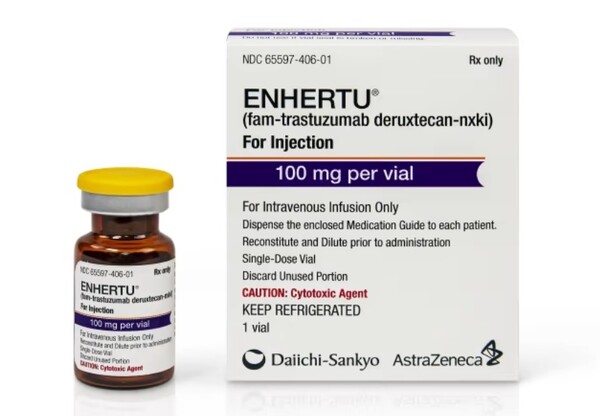Enhertu (trastuzumab deruxtecan), a next-generation antibody-drug conjugate (ADC) developed by Daiichi Sankyo, recently passed the Pharmaceutical Reimbursement Evaluation Committee (PREC)'s deliberations, moving closer toward health insurance coverage.
On Thursday, the Health Insurance Review and Assessment Service (HIRA) held the second PREC meeting to deliberate the appropriateness of providing insurance benefits for Enhertu.

Enhertu won recognition for reimbursement for individuals with unresectable or metastatic HER2-positive breast cancer who have previously received one or more anti-HER2-based therapies, and with locally advanced or metastatic HER2-positive gastric or gastroesophageal junction adenocarcinoma who have previously received two or more therapies, including anti-HER2 therapy.
The approval from PREC comes nine months after Enhertu passed the Cancer Disease Review Committee (CDRC) in early May last year. To get insurance benefits, the company must conduct drug price negotiations with the National Health Insurance Service for about 60 days and wait for a decision by the Health Insurance Policy Review Committee under the Ministry of Health and Welfare.
Enhertu has been subject to a national petition drive even before its introduction to Korea and has garnered great attention from Korean breast cancer patients, especially those with HER2-positive breast cancer, as it has demonstrated an overwhelming survival rate improvement compared to Roche's ADC, Keytruda (trastuzumab emtansine).
After the Ministry of Food and Drug Safety approved it in September 2022, the drug's annual cost of about 150 million won ($113,080) has become a hot topic. Amid the surge of petitions from patients unable to take the drug due to financial burdens, it became an agenda item at the Assembly’s Health and Welfare Committee and placed on the parliament’s administrative audit.
In January, the drug evaluation committee decided to re-discuss Enhertu’s reimbursement, prompting a patient group to deliver a protest statement signed by 6,451 people to HIRA.
Meanwhile, on the same day, Novartis' hereditary recurrent fever syndrome drug Ilaris (canakinumab) was also tabled as an agenda item at the meeting and was approved.
Out of Ilaris’ five indications -- cryopyrin-associated periodic syndrome (CAPS), tumor necrosis factor receptor-associated periodic syndrome (TRAPS), hyperimmunoglobulin D syndrome/mevalonate kinase deficiency (HIDS/MKD), familial Mediterranean fever (FMF), and systemic juvenile idiopathic arthritis (SJIA) – three (CAPS, TRAPS, and FMS) won recognition as appropriate for reimbursement.
However, the reimbursement of Ilaris was subject to the condition that the pharmaceutical company submit additional evidence in the future.
Besides, seven morning sickness treatments, including Hyundai Pharm's Diclectin (doxylamine succinate/pyridoxine hydrochloride), also won conditional approval.
Diclectin and seven other items are used to "control nausea and vomiting in pregnant women who do not respond to conservative therapies," and the committee determined that the drug's price is appropriate if the pharmaceutical company accepts a price below the government's proposed valuation.
Related articles
- Cancer expert appreciates Enhertu’s efficacy, advocates for flexible coverage
- HIRA denies responsibility for delayed coverage of new drugs Enhertu, Ilaris
- New ADC drug Enhertu fails to pass reimbursement assessment panel
- BeiGene applies for insurance benefits for esophageal cancer drug Tevimbra
- Breast cancer patients keep appealing for quick reimbursement of Enhertu
- All eyes of patients and drugmakers are on reimbursement of Enhertu
- ‘Recognizing Enhertu’s innovative drug price will help Korean patients and industry’
- Innovative new drug Enhertu to get insurance benefits as early as April
- Enhertu to get insurance coverage for metastatic breast/stomach cancer from April

